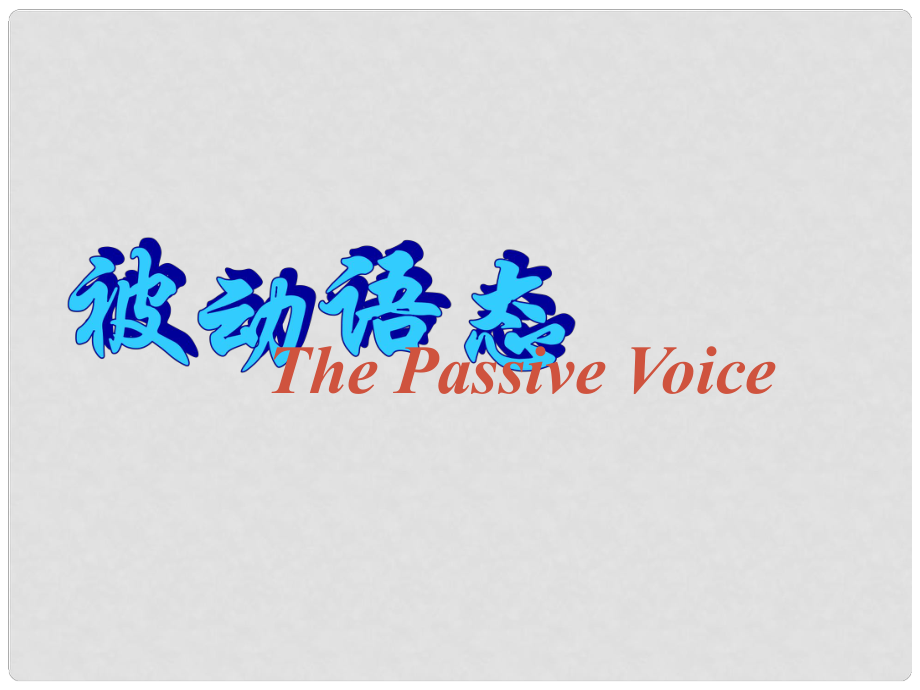《河北省唐山市灤南縣青坨營(yíng)鎮(zhèn)初級(jí)中學(xué)九年級(jí)英語全冊(cè) Unit 3 Could you please tell me where the restrooms are被動(dòng)語態(tài)課件 (新版)人教新目標(biāo)版》由會(huì)員分享���,可在線閱讀���,更多相關(guān)《河北省唐山市灤南縣青坨營(yíng)鎮(zhèn)初級(jí)中學(xué)九年級(jí)英語全冊(cè) Unit 3 Could you please tell me where the restrooms are被動(dòng)語態(tài)課件 (新版)人教新目標(biāo)版(36頁(yè)珍藏版)》請(qǐng)?jiān)谘b配圖網(wǎng)上搜索�。
1���、 The Passive Voice主動(dòng)語態(tài):表示主語是動(dòng)作的執(zhí)行者�。主動(dòng)語態(tài):表示主語是動(dòng)作的執(zhí)行者�����。被動(dòng)語態(tài):表示主語是動(dòng)作的承受者���。被動(dòng)語態(tài):表示主語是動(dòng)作的承受者����。如:如:Many students study English.(主動(dòng)語態(tài)主動(dòng)語態(tài)) English is studied by many students. (被動(dòng)語態(tài)被動(dòng)語態(tài)) 助動(dòng)詞助動(dòng)詞be有人稱�、數(shù)的變化有人稱、數(shù)的變化,其變化規(guī)其變化規(guī)則與則與be作為連系動(dòng)詞時(shí)一樣�����。作為連系動(dòng)詞時(shí)一樣����。如:如:The desk is made of wood. The desks are made of wood.He is a
2、sked a question by the teacher.被動(dòng)語態(tài)的結(jié)構(gòu)被動(dòng)語態(tài)的結(jié)構(gòu)助動(dòng)詞助動(dòng)詞be+及物動(dòng)詞及物動(dòng)詞的過去分詞的過去分詞1.1.一般現(xiàn)在時(shí)的被動(dòng)語態(tài)結(jié)構(gòu):一般現(xiàn)在時(shí)的被動(dòng)語態(tài)結(jié)構(gòu):waterwatered watereduseused usedstudystudied studiedstopstopped stoppeddodid doneriderode riddenFor exampleby many students.1.Many students study English.English is studied2.They make shoes in that
3、factory.Shoes are madeby themin that factory.by the teacher.Heis asked questions1. 找賓語找賓語 -即動(dòng)作的承受者即動(dòng)作的承受者They make shoes in that factory. Shoes2. 判斷賓語的單復(fù)數(shù)判斷賓語的單復(fù)數(shù) -即即be動(dòng)詞的單復(fù)數(shù)動(dòng)詞的單復(fù)數(shù).are made3. 判斷動(dòng)詞的時(shí)態(tài)判斷動(dòng)詞的時(shí)態(tài) -即即be動(dòng)詞的時(shí)態(tài)動(dòng)詞的時(shí)態(tài).4. 修改謂語的形式修改謂語的形式 -即原句動(dòng)詞改為過去分詞即原句動(dòng)詞改為過去分詞 5. 修改原句的主語修改原句的主語 -即即by+ 賓語(原主語)賓語(
4���、原主語). by them.主變被解題步驟主變被解題步驟主變賓主變賓, ,賓變主賓變主, , 謂動(dòng)謂動(dòng)be done be done 時(shí)不變時(shí)不變, ,人稱��、數(shù)�����、格隨著變?nèi)朔Q����、數(shù)����、格隨著變She waters the flowers every day.The flowersWhat does she do every day?every day.are watered by herThey do their homework after school.Their homework is done by them after school.He plays basketball every w
5���、eek. Basketball is played by him every week. They play football on Sunday. Lucy does the homework in the evening. They often use computers in class. We make these machines in Beijing.Football is played by them on Sunday.The homework is done by Lucy in the evening.Computers are often used by them in
6����、class.These machines are made in Beijing.1. They bought ten computers last term by them last term.2.2.一般過去時(shí)的被動(dòng)語態(tài)結(jié)構(gòu):一般過去時(shí)的被動(dòng)語態(tài)結(jié)構(gòu):was/were +過去分詞過去分詞last year.Many trees were plantedTen computerswere bought3. I bought a computer last term A computer was bought (by me) last term.The students planted man
7���、y trees yesterday.Many trees were planted by the students yesterday. They built the tall building last year. He took good care of his little brother yesterday. We cleaned our classroom just now. They used this room for resting.The tall building was built by them last year.His little brother was take
8���、n good care of by him yesterday.Our classroom was cleaned by us just now.This room was used for resting by them.3.3.一般將來時(shí)的被動(dòng)語態(tài)結(jié)構(gòu):一般將來時(shí)的被動(dòng)語態(tài)結(jié)構(gòu):will be+過去分詞過去分詞1.They will finish the work in ten days.by them in ten days.The work will be finished2.Tom will clean the room tomorrow.The room will be clean
9�����、ed by Tom tomorrow. We will have a sports meeting next week. Children will take some photos in the schoolyard tomorrow. The headmaster will give a talk this afternoon.A sports meeting will be had by us next week.Some photos will be taken by children in the school tomorrow.A talk will be given by the
10����、 headmaster this afternoon.4.4.含有情態(tài)動(dòng)詞的被動(dòng)語態(tài)結(jié)構(gòu):含有情態(tài)動(dòng)詞的被動(dòng)語態(tài)結(jié)構(gòu):can/may/must/should + be+過去分詞過去分詞1.Amy can take good care of Gina by Amy.Ginacan be taken good care of Ann can take good care of the cats The cats can be taken good care of by Ann.情態(tài)動(dòng)詞情態(tài)動(dòng)詞(model verb): S+ can/must/should等情態(tài)動(dòng)詞等情態(tài)動(dòng)詞 + be+過去分詞過
11�、去分詞We should clean the classroom every day.The classroom should be cleaned by us every day.1.He can take care of the baby.2.Lucy may draw the pictures.3.You must turn off the lights.4.They should learn English well. The baby can be taken care of by him.The picture may be drawn by Lucy.The lights mus
12、t be turned off by you.English should be learned well by them.1.Some workers are painting the rooms nowby some workers now.The rooms are being painted1.We have made twenty more keysby us.Twenty more keys have been made表格:被動(dòng)態(tài)基本結(jié)構(gòu)時(shí)態(tài)時(shí)態(tài)被動(dòng)語態(tài)結(jié)構(gòu)被動(dòng)語態(tài)結(jié)構(gòu)一般現(xiàn)在時(shí)一般現(xiàn)在時(shí)一般過去時(shí)一般過去時(shí)現(xiàn)在進(jìn)行時(shí)現(xiàn)在進(jìn)行時(shí)過去進(jìn)行時(shí)過去進(jìn)行時(shí)一般將來時(shí)一般將來時(shí)過去將來時(shí)過
13���、去將來時(shí)現(xiàn)在完成時(shí)現(xiàn)在完成時(shí)過去完成時(shí)過去完成時(shí)am/is/are donewas/were doneam/is/are being donewas/were being doneshall/will/be going to be donewould be donehave/has been donehad been done 1.Our school _in 1993.(open)2.The young trees must_ _ _ well. (look after)3. _ this building_(build)last year?4.The book _ _(write)by him last year.5.The 29th Olympic Games will_ _ (舉行) in UK in 2012.was openedbe looked afterWas built was writtenbe held
 河北省唐山市灤南縣青坨營(yíng)鎮(zhèn)初級(jí)中學(xué)九年級(jí)英語全冊(cè) Unit 3 Could you please tell me where the restrooms are被動(dòng)語態(tài)課件 (新版)人教新目標(biāo)版
河北省唐山市灤南縣青坨營(yíng)鎮(zhèn)初級(jí)中學(xué)九年級(jí)英語全冊(cè) Unit 3 Could you please tell me where the restrooms are被動(dòng)語態(tài)課件 (新版)人教新目標(biāo)版

